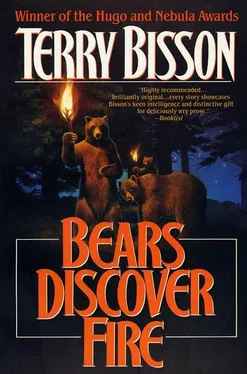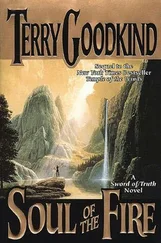“Likes?”
“We allow ourselves certain anthropomorphisms, Major. We will correct for them later. If necessary. More coffee?”
While she poured us both another cup, I looked around the room; but with lunies it’s hard to tell European from Asian, male from female.
“So where’s this Mersault?” I asked. “Is he here?”
“Not exactly,” Hvarlgen said. “He walked out of an airlock the next morning. But our friend the AO is still with us. Come. I’ll show you.”
We drained our coffee and I followed Hvarlgen down the tube toward the periphery dome known as Other. She ran with her chair tilted back, so that her front wheels were almost a foot off the floor; I was to learn that this angle of elevation reflected her mood. Other was divided into two semi-hemispherical rooms used to grow the environmental that we’d called “weed & bean.” There was a small storage shed between the two rooms. We headed straight for the shed. A lunie with a ceremonial (I hoped) wiregun unlocked the door and let us into a gray closed wedgie, small as a prison cell. The door closed behind us. The room was empty except for a plastic chair facing a waist-high shelf, on which sat a clear glass bowl, like a fishbowl, in which was—
Well, a shadow.
It was about the size of a keyboard or a cantaloupe. It was hard to look at; it was sort of there and sort of not there. When I looked to one side, the bowl looked empty; whatever was (or wasn’t) in it, didn’t register on my peripheral vision.
“Our bio teams have been over it,” Hvarlgen said. “It does not register on any instruments. It can’t be touched, weighed, or measured in any way, not even an electrical charge. It’s not even not there. As far as I can guess, it’s some kind of antiparticle soup. Don’t ask me how our eyes can see it. I think they just see the isn’t of it, if you know what I mean.”
I nodded even though I didn’t.
“It doesn’t show up on video; but I am hoping it will register on analog.”
“Analog?”
“Chemical. We’re filming it.” Hvarlgen pointed to a gun-like object jerry-rigged to one wall, which whirred and followed her hand, then aimed back at the bowl. “I had this antique shipped up especially for the job. Everything our AO does is captured on film, twenty-four hours a day.”
“Film!” I said. I was impressed again. “So what exactly does it do?”
“Sits there in the bowl. That’s the problem. It refuses to—but is ‘refuse’ too anthropomorphic a word for you? Let me start over. As far as we can tell, it will only interact with living tissue.”
A shiver went through me. Living tissue? That was me, for a few more years anyway, and I was beginning to understand, or at least suspect, why I was here. But why me? “What exactly do you mean by ‘interact’?” I asked.
Hvarlgen scowled. “Don’t look so worried,” she said. “In spite of what happened to Mersault, this is no suicide assignment. Let’s go get another cup of coffee, and I’ll explain.”
We left the AO to its bowl, and the lunie with the wiregun to lock up. Back at Grand Central, Hvarlgen poured two more cups of thick, lunar coffee. I was beginning to see her as a wheeled device that ran on the stuff.
“SETI was set up in the middle of the last century,” she said. “In a sense, Voyager was part of the program.
NASA took it over toward the end of the century and changed the name, but the idea was the same. They were searching for evidence of intelligent life, the assumption being that actual communication over such vast distances would be impossible. Contact was considered even more remote. But in the event that it did occur, it was assumed that it probably would not be a ‘take me to your leader’ sort of thing, a spaceship landing in London or Peking; that it would be more complicated than that, and that plenty of room for human sensitivity and intuition should be built into the system. Some flexibility. So SETI’s directors set up the E (for ‘Elliot’) Team which would swing into operation on first contact and operate, for twenty-one days only, in strictest secrecy. No press, no politics. No grown-ups, if you will. It would be run by a single person instead of a committee; a humanist rather than a scientist.”
“A woman rather than a man?”
“That’s just been the luck of the draw. You’ll be surprised to learn how it has backfired in this case.” Hvarlgen scowled again. “Anyway, by the time I got the job, the E Team was more of a sop thrown to the soft sciences than a working position. A brief orientation, a stipend, and a beeper that was never expected to beep. But the mechanisms were still in place. I was visiting psychology professor at UC Davis, on leave from Reykjavik U, when I got the call—within hours of the Jean Genet incident. I was already on my way up to High Orbital when Mersault died. Or killed himself.”
“Or was killed,” I offered.
“Whatever. We’ll get into that later. At any rate, I exercised the extraordinary authority which the UN had granted the E Team—figuring it would never be used, I’m sure—and had this whole operation set up here at Houbolt.”
“Because you didn’t want to bring the AO down to Earth.”
“It didn’t seem like a good idea, at least until we knew what we were dealing with. And High Orbital was in such bad shape, plus it’s hard to find people who can tolerate zero g for long periods. I know the Moon since I did my doctoral project here. So here we are. Everything that has happened since Mersault’s death has been my decision. My E Team mandate only extends for six more days. After that, our friend here goes either to the full SETI Commission, as an ET, or to the Q Team—the Quantum Singularity Team—as an AO. Time is of the essence; I’m on a fairly short string, you see. So while I was waiting at High Orbital for my lunie staff to prepare Houbolt, I initiated the second contact myself. I stuck my hand—my right hand—into the bowl.”
I looked at her with a new and growing respect.
“It flowed out of the bowl and up my arm, a little above my elbow. Like a long glove, the kind my great-grandmother used to wear to church.”
“And?”
“I wrote this down.” She showed me a pad on which was written:

“It’s Icelandic and it means ‘New Growth.’ I had brought the pad and pencil with me, along with a tape recorder. It was over before I knew it; it didn’t even feel strange. I just picked up the pencil and wrote.”
“This is your handwriting?”
“Not at all. I’m right-handed, and I wrote this with my left. My right hand was in the bowl.”
“Then what?”
“Then it flowed—sort of rippled; it’s quite strange, but you’ll see—back down my arm and into the bowl. All this is at High Orbital in zero g, remember, and there’s nothing to keep our little ET in the bowl except that it wants to be there. Or something.”
“You’re calling it an ET now.”
“Wouldn’t you call this communication, or at least an attempt to communicate? Unofficially speaking, this and its method of arrival are enough to convince me. What else would you call it but an ET?”
“A Ouija smudge?” I thought—but I said nothing. The whole business was beginning to sound crazy to me. The dark nonsubstance in the bowl had looked about as intelligent as the coffee left in my cup; and I wasn’t too sure anymore about the woman in the wheelchair.
“I can see you’re not convinced,” said Hvarlgen. “No matter; you will be. At any rate, I spent the next few hours under guard, like Odysseus lashed to the mast, to make sure I didn’t follow Mersault out an airlock. Then I tried it again.”
Читать дальше













